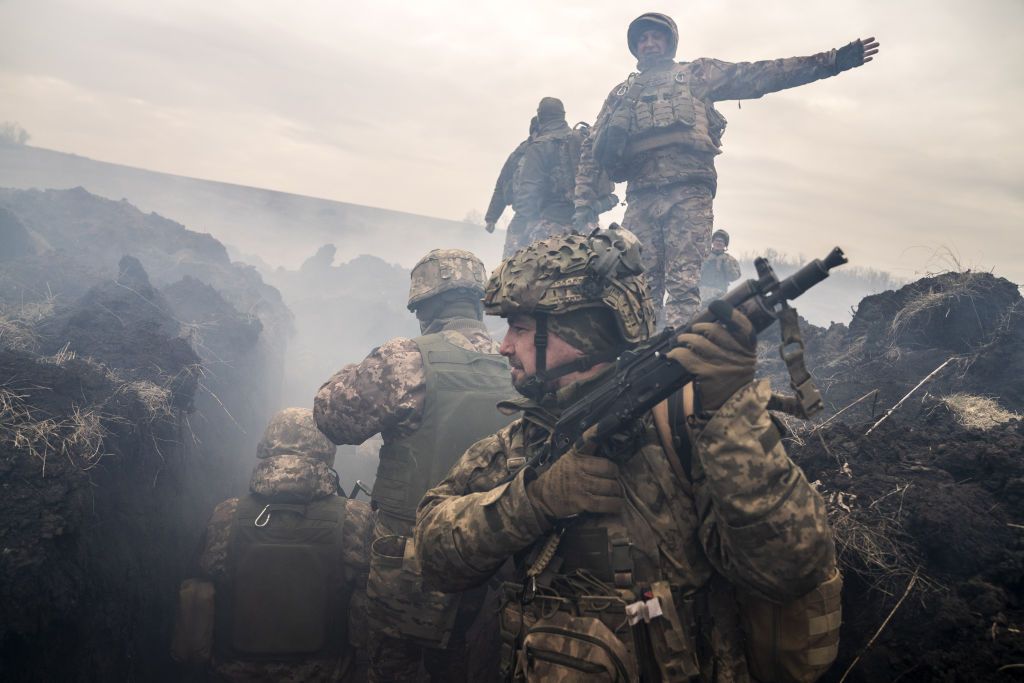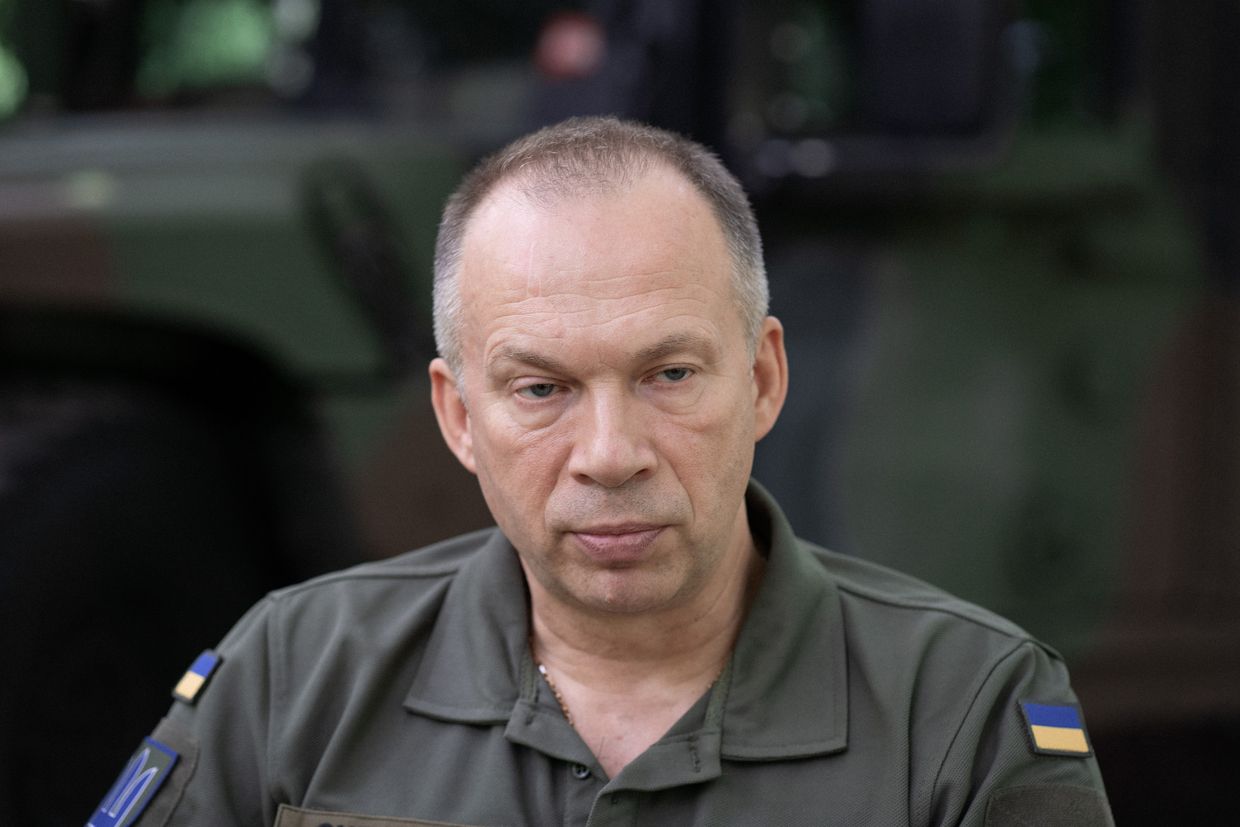Ukraine war latest: Russia launches large-scale attack, destroys critical energy infrastructure
Key updates on April 11:
- Russia launches large-scale attack across Ukraine, hitting energy infrastructure
- Parliament passes mobilization bill in second reading
- Mayor: Russia's war causes at least $2.9 billion in damages to Mykolaiv
- Russian attack on Mykolaiv kills 4, injures 5
- Ground Forces: Heads of southern, eastern military commands reassigned to new posts.
Russian forces launched a massive aerial attack across Ukraine overnight on April 11, targeting critical infrastructure in multiple regions.
The attacks damaged energy facilities in Kharkiv, Kyiv, Zaporizhzhia, Odesa, and Lviv oblasts, said Ukraine's state-owned energy operator Ukrenergo.
The Trypillia Thermal Power Plant in Ukrainka, Kyiv Oblast, was completely destroyed in the attack, the state energy company Centrenergo said. This led to the total loss of Centrenergo's generating capacity.
The military announced that Russia had launched drones, cruise missiles from Tu-95 bombers, and Kinzhal hypersonic missiles at various regions.
Explosions were reported in the city of Kharkiv at around 5 a.m. local time. According to Kharkiv Oblast Governor Oleh Syniehubov, the region was struck at least 10 times, causing damage to critical infrastructure.
No casualties were reported.
Syniehubov later clarified that Russia used S-300 anti-aircraft missiles in the attack against Kharkiv's energy facility. An apartment building was also damaged as a result.
Kharkiv Mayor Ihor Terekhov reported that a thermal power plant that powers the city was damaged, and a transformer substation was completely destroyed.
Russian strikes were also reported in Ukraine's western oblasts.
Russian missiles and drones targeted two energy sites in Lviv Oblast, namely a gas distribution facility in the Stryi district and a substation in the Chervonohrad district, the governor said.
Firefighters promptly extinguished the resulting fire. No casualties or outages were reported in the oblast.
Residents reported explosions in Ivano-Frankivsk Oblast at around 6:30 a.m. local time.
Explosions were also reported in Zaporizhzhia Oblast. Russian missiles damaged an energy infrastructure facility in the region, Governor Ivan Fedorov said.
Ukraine's air defense downed seven Shahed-type drones over Odesa Oblast, said Oleh Kiper, the region's governor. Fallen debris started a fire on the territory of an energy facility.
No casualties or outages were reported in the region.
Parliament passes mobilization bill in second reading
Ukraine's parliament on April 11 passed the updated mobilization bill in its second reading.
The bill was supported by 283 lawmakers, with 49 MPs from some opposition parties abstaining.
Passing the mobilization bill is a key component of the Ukrainian political and military leadership's efforts to update the legal framework around conscription in order to ramp up mobilization in 2024, in the works since late last year.
After an initial, contentious version of the mobilization bill was withdrawn in January, a new, updated version passed the first reading on Feb. 7. Lawmakers have proposed over 4,000 amendments to the bill since then.
Several key provisions of the earlier draft law were eventually passed by the parliament separately, with President Volodymyr Zelensky signing three laws in early April: on the lowering of the conscription age to 25, the introduction of an electronic register for conscripts, and the canceling of the "partially eligible" status.
The final version of the mobilization bill was approved by the parliament's National Security and Defense Committee on April 9.
Of the provisions remaining in the bill, key points include the right of disabled soldiers and those who have returned from captivity to discharge themselves, and the introduction of mandatory medical commission checks for those who previously held the "partially eligible" status.
Other provisions include penalties for those deemed to be dodging the draft, including the potential revoking of consular services and driver's licenses.
The parliament also voted to remove provisions on demobilization, which previously foresaw soldiers having the right to leave the military after 36 months of service, from the bill so that they could be considered separately.
According to a letter obtained by Ukrainska Pravda and published on April 9, the removal of demobilization from the bill came at the request of Commander-in-Chief Oleksandr Syrskyi.
Mayor: Russia's war causes at least $2.9 billion in damages to Mykolaiv
Russian attacks on the southern city of Mykolaiv have caused at least $2.9 billion in damages, Mykolaiv Mayor Oleksandr Senkevych told reporters at the International Mayors Summit outside Chisinau, Moldova, on April 11.
The city authorities have mapped the destructions to calculate the total amount of damages, but this figure "increases every day" due to constant bombardments, Senkevych said.
The estimated cost of the post-war recovery and reconstruction from the whole of Ukraine has risen to $486 billion over a 10-year period, the World Bank reported in February.
Denmark has prioritized specifically restoring Mykolaiv and the surrounding region as part of its policy of support to Ukraine, devoting 60% of its development aid to the region.
Mykolaiv had a pre-war population of 470,000 but now lies roughly 60 kilometers (37 miles) north of the front line, making the city and the surrounding region a target of Russian forces.
When asked by the Kyiv Independent if the slow down in military aid from the West puts Mykolaiv in danger of a potential Russian offensive, Senkevych said that supplies of ammunition and weapons are "very important," but the "biggest asset that we are losing now is people."
"To create a tank, you need like eight months to a year, to create a missile unit (you need) three months, but to create Ukrainian warrior, you need at least 18 years," Senkevych said.
No country can deliver personnel, Senkevych said, but more deliveries of military aid could save lives on the front line by ensuring Ukrainian soldiers are properly equipped.
Russian attack on Mykolaiv kills 4, injures 5
A Russian attack against Mykolaiv on April 11 killed four people and injured five, the military reported.
Shortly before the announcement, the Ukrainian military warned of a possible missile attack in the oblast. The Suspilne media outlet reported explosions in the city at around 12 p.m.
The attack against Mykolaiv damaged residential buildings, industrial facilities, and cars, the military said.
Senkevych told a Kyiv Independent reporter that the strike targeted an old industrial facility.
Mykolaiv Oblast is a regular target of Russian attacks.
Ground Forces: Heads of southern, eastern military commands reassigned to new posts
Andrii Kovalchuk, the head of Southern Operational Command, and Serhii Litvinov, the head of Eastern Operational Command, will leave their current posts, the Ground Forces' spokesperson, Volodymyr Fitio, told the Kyiv Independent on April 11.
Lawmaker Oleksii Honcharenko said on April 9 that Kovalchuk and Litvinov were dismissed from their respective commands, adding that these changes would not be "the last ones."
Honcharenko announced the same day that Major General Hennadii Shapovalov, the ex-commander of the 59th Motorized Infantry Brigade, was appointed as the new head of the Southern Operational Command, while Brigade General Volodymyr Shvediuk, who previously served in the Territorial Defense Forces, took over the Eastern Operational Command.
According to the military's statement, Litvinov became a deputy head of Ukraine's National Defense University, and Kovalchuk was appointed as the head of the Odesa Military Academy.
Litvinov has served as the head of the Eastern Operational Command since August 2021.
Kovalchuk has been deployed as a peacekeeper to U.N. missions in Kosovo, Liberia, and Cote d'Ivoire. He also participated in combat operations in Donetsk Oblast at the beginning of the Russian invasion in 2014 before the assault on Luhansk International Airport, where he was wounded.
In 2016, Kovalchuk was awarded the title of Hero of Ukraine.
Kovalchuk was appointed the head of the Southern Operational Command in August 2021. The following year, Kovalchuk commanded the southern counteroffensive in Kherson Oblast.
He was also credited by the General Staff as the one who planned the counteroffensive in Kharkiv Oblast, which was commanded on the ground by General Oleksandr Syrskyi.














